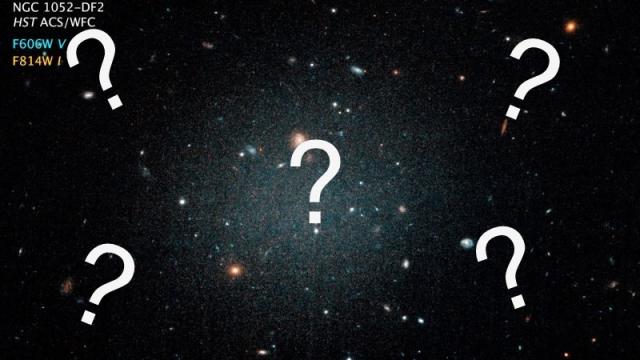Strong scepticism should always accompany strong claims. One such recent claim has generated a ton of talk about a strange, fuzzy galaxy that appears to be missing its dark matter.
Ultra-diffuse galaxy NGC1052-DF2. Image: Pieter van Dokkum/Ryan F. Mandelbaum
That a galaxy would have no dark matter is an amazing finding, and it was covered rather uncritically by a lot of news outlets (including us!). Since then, some scientists have taken to social media and the arXiv science paper server to discuss the scant data used to make the surprising conclusion.
“The idea we were seeing a strong signature of a dark matter-free system seems incorrect,” Michelle Collins, astronomy lecturer at the University of Surrey in the United Kingdom, told Gizmodo.
Last month, the prestigious science journal Nature published a striking observation from a team of astronomers with a title akin to astronomy clickbait: “A galaxy lacking dark matter.”
Using their telescope, the Dragonfly Telephoto Array, they spotted a dim galaxy shaped like a fuzzy and roughly the same width as the Milky Way. They observed the speed of 10 bright collections of stars and realised that it appeared the galaxy was moving way slower than they expected.
That would imply to the researchers that NGC1052-DF2 was missing the dark matter that many astronomers think makes up the vast majority of most galaxies’ mass.
Dark matter, you might remember, describes a problem more than a solution. Observations of the universe’s gravity seem to demonstrate more mass than astronomers can measure with their telescopes, perhaps five to six times more. Physicists generally think there’s a new kind of matter yet to be detected, though many instead argue that the laws of gravity have a hole.
You can tell a galaxy’s mass based on how quickly it rotates – the more mass it has, the faster it would have to spin in order not to collapse. Most galaxies rotate too fast, while, according to Yale University scientist Pieter van Dokkum’s team, NGC1052-DF2 barely rotates at all.
Nearly all news outlets who covered the story (again, including me) generally reported the findings of the Nature paper without serious doubt. But some astronomers aren’t convinced.
At the centre of the discussion is statistics. It’s mathematically difficult to make any conclusions using very small datasets, especially when you’re talking about just 10 clusters of stars in an entire galaxy, explained Nicolas Martin, astronomer at the Observatory in Strasbourg in France, in a Twitter thread.
He and others crunched the data differently, and found that sure, maybe the galaxy was missing dark matter, but maybe it wasn’t. “The current data set doesn’t warrant such a strong conclusion,” he wrote. He’s since published the analysis with others, including Collins, on the arXiv server.
One of the disagreements, for example, stems from what to do with one of the 10 globular clusters that seems to be an outlier from the other nine based on how it moves. Both groups weigh it differently, Collins told me.
Van Dokkum has since addressed some of the concerns on a personal website, and thought the debate was “missing the forest from the trees”. He noted to Gizmodo in an email that folks generally agree with a similar velocity spread of the globular clusters, one that implies far less dark matter than the average galaxy – so it’s still “lacking” dark matter, but maybe not “missing” dark matter.
But Collins responded to me that if you try to base the mass of more familiar dark matter-filled galaxies on just 10 specially selected globular clusters, you can make them, too, appear to not have any dark matter.
There are other rebuttals to van Dokkum’s claims, including another arXiv paper discussing whether the observation really challenges alternative theories to explain the source of the stuff we call “dark matter”. Another discusses the behaviour of these “ultra-diffuse” galaxies more generally.
However, it is important to note that van Dokkum and his team’s papers have been peer reviewed by editors at Nature, but the arXiv papers have not yet been reviewed or accepted in any journal.
But the debate has been going on for several weeks on Twitter. One astronomy grad student, Mia de los Reyes at CalTech in California, even turned the discussion into an American Chopper meme:
look I summarized the statistics debate re: NGC1052-DF2
I wanted to include some other points, incl “maybe GCs (if they are GCs) are bad tracers of DM potential” and ofc “but MOND!!!!!” but it turns out that stats arguments are hard enough to fit into a 5-panel meme already pic.twitter.com/AxbYqopIcD
— Mia de los Reyes (@MiaDoesAstro) April 16, 2018
Original study author Van Dokkum himself doesn’t mind the debate – he calls it “excellent”, and “exactly what we are all supposed to do, trying to replicate each other’s results and looking for loopholes in the interpretation”. He told Gizmodo he also thought it was good to see the use of social media and the arXiv preprint server to give voice to younger astronomers with good ideas.
It would take a lot to convince Collins that the galaxy was truly missing dark matter’s effects. “You’d need significantly more data than they have presented here,” she said.
But mainly this goes to show science at its very core: It’s an ever-changing story where evidence and debate take us closer to the truth. And it’s a good reminder of something that a lot of science writers, including me, didn’t apply to this paper: We need to remain sceptical about any new results until the larger science community has had time to digest and debate them.
